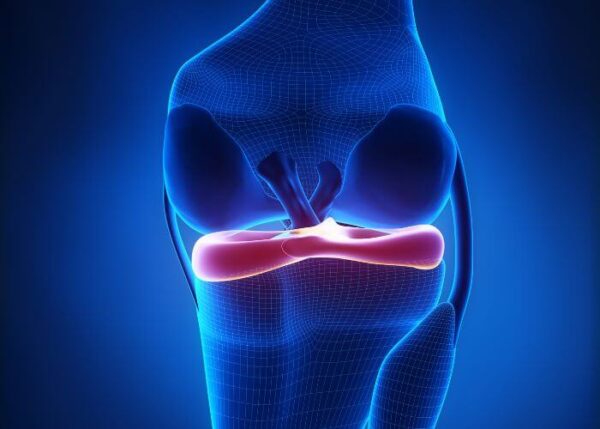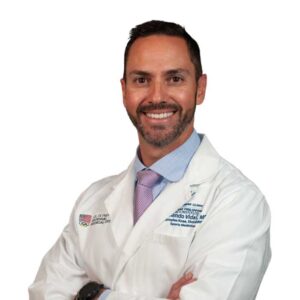What is a Meniscus Tear?
The knee is made up of three bones, the femur (thigh bone), tibia (shin) and patella (kneecap). The knee has soft tissue that connects these bones and holds them in place. Between the femur and the tibia are two C-shaped discs of cartilage called the meniscus. They act as shock absorbers for the bones and help to keep the knee stable. Their wedge shape helps distribute load between the rounded surface of the femur and the flat top of the tibia. The menisci can be torn or damaged if the knee twists suddenly, while it is bent. This can happen while participating in sports that cause quick twisting or jumping or sudden stops and turns. Dr. Armando Vidal, pediatric orthopedic sports specialist treats children, youth and teens who have torn their meniscus. Patients in Vail, Aspen and the surrounding Denver, Colorado communities trust his expertise and extensive training to help return them to their sporting activities.

How is a Meniscus Tear Different in Children and in Adults?
The good news is children have a better blood supply to their meniscus than adults. This blood supply can heal certain meniscus tears without the need for surgical intervention. If the meniscus tear is too serious however, surgery may be required. Fortunately, because of this blood supply, meniscus repairs in children also heal better than adults.
It is important to know that children can sometimes have a unique type of meniscus problem called a discoid meniscus. This abnormally shaped meniscus affects the lateral (outside) part of the knee and is more susceptible to tearing. Tears of a discoid meniscus often require surgery.
What is Meniscus Repair and Transplantation in Children?
Meniscus repair and replacement in children is a very specialized field that has been getting some attention in recent years. In general, we will try to repair any meniscus tear in a child – even if it is a pattern that is not particularly ideal for repair.
In some cases, the meniscus is not salvageable, and a meniscus transplant is necessary. For children whose bones are still growing (have an open growth plate) meniscus transplantation is often delayed due to the risk of injuring the growth plate. This can lead to growth arrest and limb deformity. For this reason, it is vital that patients seek an orthopedic surgeon who has experience with meniscus repair and transplantation in children, youth and teens. Dr. Armando Vidal has been performing this type of specialized surgery with well-documented success.
Should an injured Meniscus in a child be left alone?
Dr. Vidal, pediatric sports medicine specialist and orthopedic surgeon would say; “It depends.” The amount of damage, where the tear is located, and if there is a good blood supply to that part of the cartilage all needs to be taken into consideration. Dr. Vidal and his team discuss the options available with the parent and child to make the best decision for the best possible outcome.
It is important to remember when considering surgery that the outside portion of the knee (lateral side) is the most sensitive to meniscus injury and cartilage loss in children. If there is significant damage, the child will experience pain and swelling. If a child loses the entire meniscus, there is nearly a 100% chance of early arthritis. The earlier the meniscus tissue is repaired or replaced; the less damage occurs. Dr. Vidal uses the latest techniques of meniscus transplantation which does not require permanent stitches and can protect the growth plate.
What about a Donor Meniscus?
The concern over using a donor meniscus (allograft) is whether or not the transplanted tissue will grow with the child or if it will grow with the child. Medical studies, done over the last 25 years, has been promising but the placement of a donor meniscus is vital to its success. Dr. Vidal suggest donor tissue for children who are nearly done, or completely done growing.
What is a Collagen Meniscus Implant?
In recent years the FDA approved a meniscus regenerative material that can induce regrowth of the meniscus tissue upon a trellis-like structure. Collagen meniscus implant (CMI) has been used in over 5,000 adult cases and is being studied for use in children. While Dr. Vidal does not yet offer this type of implant, the studies look promising, especially since children are often able to re-grow their own tissue, better than adults.
What happens after my child has a Meniscus Repair or Transplantation?
Several factors directly effect the outcome of a meniscus repair or transplantation. For patients in Vail, Aspen and the surrounding Denver, Colorado communities, Dr. Vidal cautions that the recovery is a marathon, not a race. Strict adherence to post-operative protocols will contribute to a successful recovery. In general, patients will be non-weight bearing for 6 weeks with passive physical therapy. Active physical therapy and strengthening exercises will occur as tolerated and under the guidance of Dr. Vidal’s team. Pediatric patients can expect a full recovery and return to activities in 9-12 months.
Pediatric Meniscus Restoration Surgeon
Does your child participate in sports involving sudden directional changes? If so, they may be at an increased risk of tearing their meniscus. Meniscus tears in children and young patients generally heal more quickly and more effectively than in adults, and oftentimes these injuries do not require surgery. Pediatric knee surgeon, Doctor Armando Vidal can help to determine if your child requires surgical repair of their damaged meniscus. Dr. Vidal has helped young patients in Vail, Aspen, and the surrounding Denver, Colorado communities who are experiencing meniscus damage for many years. Contact Dr. Vidal’s team today!

Locations
180 S Frontage Rd W
Vail, CO 81657
226 Lusher Court
Ste 101
Frisco, CO 80443
322 Beard Creek Road
Edwards, CO 81632


